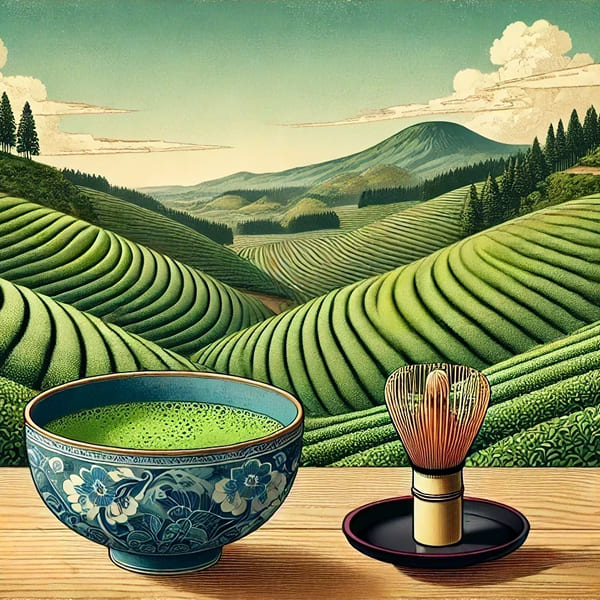Matcha: Discover the Traditional Japanese Green Tea Loved Worldwide

Contents
Vivid green. Earthy aroma. A single sip that awakens both body and mind.
From ancient Zen temples to trendy cafés across the globe, matcha green tea has become a symbol of wellness, mindfulness, and Japanese tradition. But matcha is more than a health trend—it's a centuries-old ritual that blends spiritual focus, artful preparation, and deep cultural meaning.
In this guide, we’ll whisk you into the world of matcha—exploring its fascinating history, meticulous production, powerful health benefits, and the many delicious ways to enjoy it today.
The Origins of Matcha: From Zen Temples to the Japanese Tea Ceremony
Matcha originated in ancient China, where Buddhist monks used powdered green tea during meditative practices. This custom arrived in Japan around the 12th century and was embraced by Zen temples for its calming and focusing effects.
By the Muromachi period (1336–1573), matcha became central to the Japanese tea ceremony (chanoyu), a ritual formalized by Sen no Rikyū. He saw matcha as a tool to cultivate inner peace, respect, and awareness, shaping tea drinking into a spiritual and artistic practice.
How Matcha Is Made: From Leaf to Vibrant Powder
True matcha is made from high-quality tencha leaves, which are shaded from sunlight for 2–3 weeks before harvesting. This process increases levels of chlorophyll, L-theanine, and other nutrients, resulting in its vivid color and umami flavor.
The steps to produce matcha include:
- Steaming the leaves to preserve color and nutrients
- Drying and removing stems and veins
- Stone-grinding into a fine, bright green powder
The result is a smooth, nutrient-rich powder that dissolves in water and delivers both taste and wellness.
Ways to Enjoy Matcha: Traditional and Modern Delights
Traditional Matcha in the Tea Ceremony
In the Japanese tea ceremony, matcha is carefully whisked with hot water using a bamboo whisk called a chasen. The process emphasizes harmony (wa), respect (kei), purity (sei), and tranquility (jaku), creating a meditative experience through tea.
Matcha in Everyday Life
Matcha has also become a versatile ingredient in modern cuisine and drinks, including:
- Matcha lattes
- Matcha-flavored desserts like ice cream, mochi, and cakes
- Matcha smoothies and health drinks
These contemporary treats make matcha accessible while preserving its rich tradition.
Matcha Health Benefits: Energy, Focus, and Antioxidants
Matcha is often considered a superfood due to its dense concentration of nutrients:
- High in antioxidants, especially catechins, which may aid in immune support and anti-aging
- Contains natural caffeine, providing a calm, sustained energy boost without the crash
- Rich in L-theanine, which promotes relaxation and focus, balancing caffeine’s effects
This unique combination of calm and clarity makes matcha ideal for those seeking both productivity and peace.
Cultural Importance of Matcha in Japan
Beyond its taste, matcha holds deep cultural significance in Japan. It is a symbol of hospitality, seasonal beauty, and spiritual connection.
Matcha is often served during:
- Tea gatherings and rituals
- Traditional festivals and New Year’s events
- Weddings, formal ceremonies, and special occasions
The way matcha is prepared and presented reflects a deep reverence for nature, craftsmanship, and human presence.
The Global Rise of Matcha Culture
Thanks to its health benefits and aesthetic appeal, matcha has spread far beyond Japan. You can now find matcha in:
- Cafés across Los Angeles, London, Sydney, and more
- Beauty products like matcha masks and creams
- Fusion cuisine, such as matcha croissants and matcha burgers
Whether you’re a foodie or wellness enthusiast, matcha’s blend of flavor and tradition is captivating people worldwide.
Final Thoughts: Why You Should Try Matcha
Matcha is more than a drink—it’s a ritual of reflection, health, and harmony. Whether you’re sipping it quietly during a tea ceremony or enjoying a matcha latte on the go, it brings centuries of culture into the present moment.
Ready to take the first step? Visit a local tea shop, try preparing a bowl at home, or attend a traditional tea gathering to fully experience the heart of matcha.